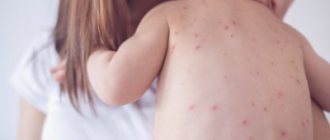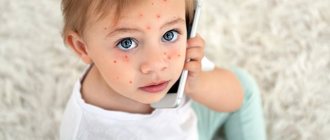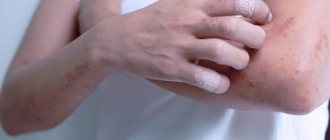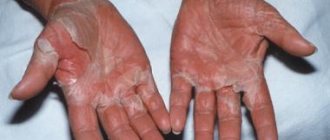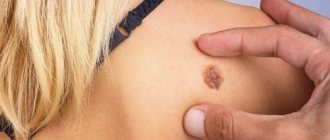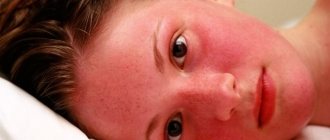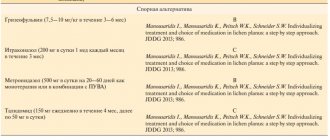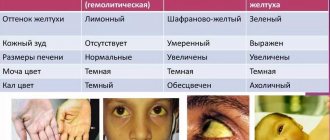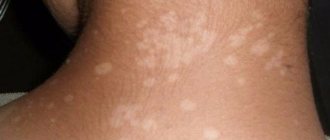The skin reacts faster than other organs to irritants, changes in environmental conditions, malfunctions of internal organs and signals the resulting discomfort with redness and itching. In addition, a rash may appear in specific areas or throughout the body. When irritation on the skin itches, redness on the body appears for no apparent reason, this may indicate the development of the disease.
You should not ignore the presence of such symptoms. It is imperative to consult a therapist or dermatologist in order to identify the provoking factor and stop contact with it or stop the course of the disease at the initial stage.
What is itching?
Every meter of skin that covers a person is penetrated by a billion nerve endings.
They instantly react to any irritants, causing a desire to remove that unpleasant itching from the sensitive organ.
The official definition of itching is a burning, tingling sensation on the skin of the body.
These sensations are very unpleasant and can occur not only on the epidermis itself, but also on the mucous membranes of the body - those organs that interact most closely with the harmful environment.
Quite often, itching can occur not only from an external irritant, but also become an alarm bell warning of the appearance of a disease in the body.
At its core, itching simply cannot become a separate disease; it always occurs together with other symptoms.
Rashes are often another problem, but they are not necessary. One thing is certain, as soon as the disease appears, people immediately try to almost scratch off their skin, trying to get rid of the itching on the body.
Skin irritation in young children
Children under one year old, as well as preschool children, are more susceptible to various rashes and skin reactions than adults. This is due to the imperfection of the protective functions of the skin, not fully formed immunity and the child’s curiosity to experience the world by touch and taste.
The most common type of skin irritation in a child, which absolutely every mother has had to deal with, is the child’s reaction to diapers - this is diaper rash or so-called diaper dermatitis. The mechanism for the formation of such irritation in children is very simple - the skin of babies is very thin and sensitive, so even a short time of the child being in a wet diaper causes redness and itching. The situation is aggravated if the mother does not wash the baby at every change or allows the child to remain in an overfilled, dirty diaper for a long time.
In addition, the use of diapers that are not the right size (tight or, conversely, too large) causes friction of the material against the skin folds, which also provokes skin irritation and causes pain to the child.
If redness of the cheeks appears in an infant, a nursing mother should reconsider her diet and keep a food diary for some time - this will help determine which of the foods she consumed in the child causes a skin reaction. Children who are already trying complementary feeding should definitely be shown to an allergist and, together with the doctor, an individual plan for expanding the baby’s diet should be drawn up.
All types of skin itching
When irritants affect nerve endings located throughout the body, a command is immediately sent to the brain to scratch a certain area of the body. However, depending on the type of itch, it can be divided into several different types that affect specific areas.
According to the time of appearance and severity of the course, itching is divided into:
- Spicy;
- Chronic.
Let's take a closer look at these types of itching.
Acute itching:
- It is characterized by a rather sudden onset and can usually hint at disturbances in the human body or in the functioning of his nervous system.
- Requires the presence of a provoking factor, often it becomes an allergen: dust, wool, types of food and others.
- At times, this type of itching occurs as a reaction of the body to certain drugs obtained synthetically, which the human body simply cannot tolerate.
It is very important to warn doctors about intolerance to a particular drug in order to prevent their entry into the body.
Chronic itching:
- More pathological;
- Can have strong intensity and cover almost the entire body;
- It is caused by a number of diseases that dermatologists simply cannot cure, so the most important point is correct diagnosis.
- Therapists get involved in identifying the causes of a chronic disease, often turning to third-party specialized doctors such as immunologists, endocrinologists and others.
Skin itching is also divided according to the degree of its distribution throughout the body:
- Localized itching affects only a small area of the body, usually as a reaction to an irritating factor, such as a bite. These itchy sensations can appear on any part of the body and are often caused by various manifestations of dermatological diseases;
- Generalized itching does not have its own boundaries, so the burning or tingling sensation can spread throughout the body.
Vitamin deficiency and stressful situations
In the spring and autumn seasons, the body needs protection most of all. It is during this period that he lacks vitamins and is susceptible to depression.
With vitamin deficiency, red spots appear in different parts of the body and can be single or collected in groups. The size of such rashes also varies: from small to large (the size of a chicken egg). The spots may peel and cause discomfort in the form of itching.
Due to constant stress and an uneven emotional state, a rash may appear on the body in the form of small reddish dots accompanied by itching. If this type of irritation occurs constantly, then it is necessary to consult not only a dermatologist, but also a neurologist, so as not to start the disease and prevent it from developing into psoriasis.
Treatment of the rashes in question consists of taking vitamin complexes (Complivit, Vitrum, Alphabet, etc.), a balanced diet (vegetables, fruits, meat, fish), walks in the fresh air and strict adherence to work and rest schedules. For prolonged depression, it is recommended to use sedative medications (for example, Novopassit).
Possible causes of itching without rashes
Itching can be a symptom of both problems that are simple enough to treat, and complex ones that require a thorough check of all internal organs and the order of their functioning.
However, almost always the life of a person with body itching becomes simply unbearable, so it is advisable to quickly solve all the problems. You may simply need to eliminate some foods from your diet, but at times it may take years and many restrictions to fully heal.
Dry skin
Ordinary dry skin is often the most common cause of itching.
This is especially true in the cold season with improper care.
Such seasonal itching usually goes away with proper moisturizing of the dermis with special cosmetics and does not require medical intervention.
Dry skin is the most harmless cause of itchy skin on the body and usually goes away with the onset of warm weather.
Taking medications
Nowadays, any medicine includes numerous synthetic substances.
It is normal for a person to individually not tolerate some of them.
If such a problem occurs, you should immediately consult a doctor.
It is worth choosing a drug with a similar effect that does not contain active substances to which the body reacts.
Allergy
When the body suffers from an allergic reaction, the body begins to produce increased histamine. It is this substance that causes unpleasant sensations in the body and on the skin surface, making you want to simply remove your skin.
For this problem, anti-allergenic drugs are prescribed, one of the functions of which is to get rid of itching by suppressing the action of histamine on the nerve endings of the skin.
When taking such medications, allergies will not provoke the appearance of itching and flaking throughout the body.
Age-related changes
As you age, your body experiences changes, one of which is the loss of skin elasticity.
It becomes drier and rougher. As it loses its basic properties, itching begins to appear, gradually spreading from the back to all other parts of the body.
Such age-related itching is considered a common occurrence and is not very intense, so it does not cause any particular discomfort.
The best way for older people to get rid of the problem is to change their diet by adding a large amount of vegetables and fruits, as well as protein foods containing amino acids that help maintain youthful skin.
High-quality cosmetics will also help, preferably for sensitive skin, since they have the softest composition.
Pregnancy
Hormonal imbalance occurs during pregnancy, so slight itching on the body is normal and does not cause problems in the absence of other symptoms.
Almost any woman during this period experiences mild discomfort in the abdominal area, which worsens slightly in the 3rd semester due to severe stretching of the skin.
As your belly grows, stretch marks often appear on your body, so itching is normal.
Contacting a gynecologist with a problem will help you choose the right remedy to relieve symptoms, but to completely get rid of the problem you will have to wait until the birth of the child.
After childbirth, you should not be bothered by itching.
Vitamin D deficiency
Exacerbation of attacks of body itching in autumn or spring is often associated with a lack of vitamin D in the body.
It is one of the main substances produced in the body.
Vitamin D is involved in the formation of the skeletal system, as well as in the optimal functioning of the immune and nervous systems, and in the regulation of hormonal levels.
Vitamin D protects the body from inflammatory processes.
To overcome the problem, a course of vitamins is often prescribed, but this is done only on the recommendation of a doctor.
Problems with the endocrine system
Problems with the endocrine system are often accompanied by body itching and a number of other symptoms reminiscent of diabetes mellitus - dry mouth, frequent urination. Most often occurs in intimate areas of the body.
Cirrhosis and hepatitis
The liver is a natural cleanser of the body, so people with a healthy organ simply do not accumulate a lot of harmful substances in the body. However, with liver problems, there is a gradual accumulation of toxins and acids in the body, which, acting on nerve endings, cause itchy skin throughout the body.
Itching is the first warning sign of cirrhosis, an incredibly dangerous disease that requires compliance with many recommendations.
Gradually, other symptoms appear, and the itching of the skin throughout the body intensifies.
Similar symptoms of cell destruction appear due to hepatitis, so liver diseases require immediate contact with a specialist and an ultrasound examination of the organ.
Diabetes
With this disease, the itching is localized, often manifesting only in intimate areas and rarely on the extremities.
It appears in only 30% of patients, usually older ones.
This itching is associated with decreased sensitivity of the body and surges in blood sugar.
That is why, if you have a disease, if there are signs of itching, it is best to use a glucometer to measure blood sugar levels in order to avoid possible complications.
The problem can be solved by limiting sugar intake and apple cider vinegar lotions.
Kidney failure
If the kidneys are not functioning properly, harmful substances from the blood cannot be completely eliminated through the urine, so they try to get out through sweat, while irritating the skin of the body.
Almost all patients with this disease experience itching, especially during hemodialysis procedures.
Mental problems
A disturbed psycho-emotional background is a common cause of itching throughout the body.
Often, even a little stress can trigger the development of the disease, and the symptoms will become more and more pronounced.
During depression, itching can become a significant problem due to the strong production of histamine, which irritates the nerve cells of the body.
Increased production of histamine during mental problems is normal, but to solve it, consultation with a practicing psychiatrist is required.
Oncological diseases
At an early stage, cancer has virtually no symptoms, so identifying it is quite difficult. People who have a predisposition to cancer at the genetic level should closely monitor their condition.
Often generalized itching throughout the body is a sign of intestinal and pancreatic cancer, because very often the tumor partially covers the duodenum.
| Body organ affected by cancer | Percentage of itching frequency | Unpleasant sensations |
| Intestines | 74 | Strong |
| Pancreas | 70 | Average level of sensations with acute periods |
| Ducts and gallbladder | 48 | Strong |
| Bladder | 22 | Moderate type of body itching |
| Liver | 33 | Strong |
| Kidneys | 12 | Light burning sensation |
| Leather | 75 | The sensations are moderate, but become more intense as skin cancer develops |
| Lungs | 9 | Average level |
Damage to areas of the brain
When local areas of the brain are damaged, such as the central or peripheral nervous system, neurogenic itching sometimes appears.
It is of a localized type, which exactly coincides with the area of the dermis for which the damaged lobe of the brain in the head is responsible.
It is always accompanied by a number of other symptoms, such as a severe headache. Capsaicin is used to relieve this type of pain.
Blood diseases
When the body develops anemia or the body simply does not have enough iron, itching becomes common.
Most often it appears in the chest, genitals or pelvis, that is, those organs that are characterized by strong blood circulation.
A problem also arises with increased hemoglobin or a high content of red blood cells in the blood.
Diagnosing blood problems is simple because of the other accompanying symptoms.
Parasites
The simplest reason for body itching.
Typically, itching is caused by the following types of parasites:
- Pinworms . Most often they cause itching on the skin in the anal area, this is due to the fact that at night they crawl out to lay eggs. But often they also cause skin rashes, also accompanied by itching.
- Roundworms . These parasites also often cause allergies: rash and severe itching on the skin, conjunctivitis and lacrimation.
- Cat's double tail . This parasite releases toxic substances directly into the blood, causing hives and severe itching.
- Trichinella . When affected by this parasitic infection, itchy skin is accompanied by profuse rashes, swelling and fever.
- Echinococcus. With this disease, hydatid cysts are formed, which themselves do not cause any symptoms. Their rupture can cause allergies, since all its toxic contents will go directly into the bloodstream. In this case, swelling, rash and itching of the skin, as well as bronchospasm, appear.
Diet
Following a diet helps normalize the functioning of the gastrointestinal tract, reduce the production of histamine, increase the body's defenses and cleanse it of toxic substances and toxins. Dietary nutrition implies the exclusion or sharp limitation of the consumption of foods belonging to the group of allergens:
- citrus fruits (except lemons);
- red fish and caviar;
- nuts;
- honey and other bee products;
- rich pastries and fresh white bread;
- carbonated sweet drinks;
- chocolate and cocoa;
- alcohol;
- canned food (meat, fish) and marinades.
It is recommended to include fresh vegetables and fruits, herbs, cereals, lean meats, and dairy products in your diet. Vegetable oils and polyunsaturated fatty acids (found in flaxseed and olive oil) improve the condition of the skin and its protective functions.
It is very important to maintain a drinking regime - for an adult, the daily intake of clean water is at least 1.5 liters, not counting tea, compote and other liquids.
Seasonal itching
The most common cause of seasonal body itching is vegetative-vascular dystonia. This is especially true in the fall and spring, when a person begins to experience an acute lack of vitamins.
To solve the problem, treatment with vitamins is prescribed by a specialist or attending physician.
The causes of scabies in winter can be more serious, but often they are simply caused by excessive dry skin due to unfavorable weather. If such a symptom appears, you should simply consult a doctor for a diagnosis.
Itchy body after shower
Standard water procedures are aimed at cleansing the body and giving a charge of vigor to the body. However, after some time after the process, the body may begin to itch.
Causes of itching:
- Water with a high content of chlorine dries the skin and causes it to tighten. As the body dries out, it becomes uncomfortable and itchy;
- Intolerance to cleaning products used due to their aggressiveness;
- Extremely cold water can cause the body to become allergic to the cold;
- Using clothes made of synthetic materials after a shower causes a disruption in the heat exchange functions of the body.
First, you should change your skin care products. The easiest way is to use hypoallergenic products or baby soap. This will relieve you of allergic problems
This problem is not a disease and you should consult a doctor only if the itching persists for a long time and causes unbearable discomfort.
Clinical researches
Clinical studies have proven the effectiveness, safety and tolerability of the products. The products are suitable for daily care of children's skin with mild to moderate forms of atopic dermatitis and during remission, accompanied by a decrease in the quality of life of patients.
Cream for sensitive skin reduces itching and irritation, relieves redness of the skin, moisturizes and gently cares for it.
Sources:
- Ratner Desiri, Avram M.R., Avram M.M., Procedures in Dermatology. Clinical cosmetology, GEOTAR-Media, 2021.
- Churolinov Petr, Herbal medicine in dermatology and cosmetics, Medicine and Physical Education, 1979.
- Schneiderman Paul, Grossman Mark, Differential diagnosis in dermatology. Atlas, Binom, 2021.
Night itching
Often, itching begins to appear at night, causing insomnia. Such a problem over a long period of time can lead to depression, mental problems and chronic lack of sleep.
Provoking factors:
- psychological problems and increased body response to stimuli;
- increased blood vessels and increased body heat at night;
- allergic reaction to hygiene products, bedding, dust, pillows;
- eczema and other dermatological problems.
Diagnostics
For proper treatment, you need to find out exactly why the itching appeared. It is best to contact a dermatologist with this problem, who will tell you whether examination by other doctors is required and, if possible, make a diagnosis.
Step by step steps:
- The first step is to exclude the most likely diseases associated with itching: diabetes, cirrhosis, worms and others. To do this, a thorough examination of the patient’s skin is carried out and an anamnesis is collected;
- Diagnostics are prescribed in the laboratory, and non-invasive research methods are used. This includes blood, stool, urine tests, ultrasound and other studies prescribed by doctors;
- If there is a suspicion of cancer, studies using tumor markers may be prescribed.
A proper study will help identify inflammatory processes and disorders in the body, if any, as well as generally assess the condition of the body.
Before going to the doctor, you should not use antihistamines, as they can distort the picture, and it will be more difficult to find out the causes of itching.
Contact and food allergies
Allergies can be of two types: food and contact. The first type is characterized by the entry of an allergen into the body through food or medicine, as well as dust or animal hair, the second is associated with touching the allergen: household chemicals, cosmetics, fabric.
When a product that causes an allergy enters the body, the irritation can spread to various parts of the skin, affecting most of the body. Symptoms: rash, swelling, red spots, itching.
With contact allergies, signs of the disease appear only at the point of contact of the epidermis with the allergen. Symptoms: irritation, peeling, dry skin, slight itching.
Drug treatment
Local treatment
The first thing you should do when itching is personal hygiene. In intimate places, washing twice a day with talcum powder will help; for generalized areas, the skin must be wiped with vinegar or talc solutions.
Ointments with an antipruritic effect will help relieve discomfort, but they cannot completely solve the problem.
These include ointments such as:
- Non-hormonal ointments : Panthenol, Fenistil, Skin-cap;
- Hormonal ointments : Prednisol, Hydrocortisone, Advantan;
- With antibiotic : Levomekol, Erythromycin, Oflocaine.
Panthenol Fenistil Skin-cap Prednisolone Hydrocortisone Advantan Erythromycin Oflocaine
Etiotropic and systematic treatment
The most likely cause of the spread of itching on the skin is increased production of histamine by the body. Therefore, to eliminate such symptoms, doctors often prescribe antihistamines, both in tablets and drops, to reduce its amount.
These include:
- Suprastin;
- Tavegil;
- Diazolin;
- Loratadine.
Suprastin Tavegil Diazolin Loratadine
Other medications are often used to relieve itching:
- Sedatives: Novo-Passit, Valerian, Motherwort;
- Corticosteroids for endocrine system disorders;
- For age-related and menopausal problems - hormonal agents;
- Sequestrants.
Sexual infections
Irritation on the skin (itching), redness in the intimate area can cause a sexually transmitted infection:
- Chlamydia – does not have pronounced symptoms, it can manifest itself in the form of yellowish discharge, pain when urinating, and redness of the groin. It provokes the development of cystitis, urethritis, vulvitis, prostatitis in men and other diseases. Treatment: antibacterial therapy, immunomodulators, antifungal suppositories.
- Candidiasis - characterized by groin irritation, white cheesy discharge, itching and burning, pain during intimacy. The disease is treated with antifungal drugs, affecting the problem from the inside and outside (Clotrimazole).
- Trichomoniasis - manifested by redness and scratching of the intimate area, the appearance of yellowish and foamy discharge. Treatment: antimicrobial (Trichopol) or antifungal (Klion-D) therapy.
Effective folk remedies
Home treatment methods will not eliminate the disease itself, but will help relieve symptoms.
The most effective folk remedies:
- Herbal infusion - it should be made from equal parts of burdock root, plantain, mint, dill seeds and nettle. Pour boiling water over a teaspoon of the mixture and leave for 20 minutes. You need to drink the infusion twice a day for a month, a glass at a time;
- Juniper tincture added to the bath will be an excellent treatment for itching. 200 grams of juniper should be boiled in a liter of water for half an hour. After this, the infusion is filtered and poured into the bath. It should be taken for 15 minutes 2 times a week;
- Dill and Parsley Salve – Take fresh herbs and place them in a blender. Grind and squeeze out the juice using a gauze cloth. The ointment should be applied to the itchy area several times throughout the day;
- Tea tree oil - add a couple of drops of oil to a cream or body lotion and apply it to damaged areas several times a day until symptoms are completely relieved;
- Medicinal soap - tar soap has an antipruritic effect. Just lather with it and leave for 5 minutes, then rinse off;
- Essential oils - to help with itching - frankincense, chamomile, sandalwood, lemon, lavender, geranium oil. They should be diluted with a base oil to reduce the concentration (3 drops of essential oil are enough for 1 tablespoon of base) and applied to the body throughout the day;
- Oatmeal compress – due to the rich composition of oatmeal, such a lotion will perfectly moisturize and nourish the skin with beneficial substances. To do this, cook a decoction. To do this, pour boiling water over a couple of tablespoons of the flakes and wait until they soften. As soon as you get a paste, it should be applied to the itchy area and left for about 15 minutes.
- Chamomile infusion – brew chamomile infusion according to the instructions on the package. It should be taken 3-4 times a day;
- Aloe – use aloe gel and apply it according to the instructions, or simply pick a fresh leaf from the windowsill and rub the juice on the itchy areas;
- Apple cider vinegar - dilute vinegar in water in a concentration of 1:10, mix the mixture well and apply it to the body with a cotton pad over problem areas. Leave on for 1 minute and then rinse off;
- Propolis tincture is more difficult to use. To do this, you need to mix 40 ml of tincture with 40 ml of glycerin, add 20 ml of peppermint tincture and 10 g of celandine. Everything needs to be infused for 20 days, after which it is used to lubricate problem areas.
Sedative medications
Sedative medications are prescribed in case of irritation due to stress, and also as additional therapy for severe itching. Glycine – helps reduce nervous tension, improves sleep, and increases performance. Therapy: 1 tablet. 3 r/day, 1 month.
- Trioxazine – prescribed for depression, neuroses, increased anxiety, fears. Treatment: 1 tablet. 2–3 r/day.
- Amizil - has a calming effect, relieves tension, blocks nervous conditions. Therapy: 1–2 mg 2–3 times a day, 4 weeks.
